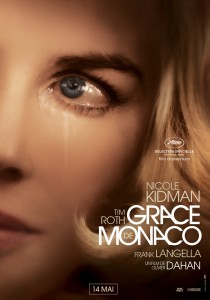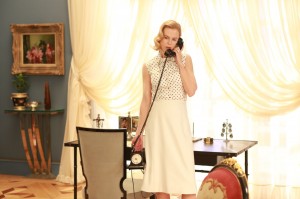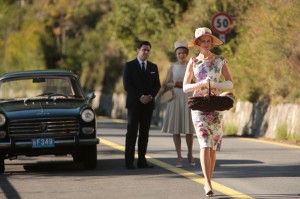 The 2014 Cannes Film Fest began on a weak note with the world premiere of the biopic, Grace of Monaco, starring Nicole Kidman.
The 2014 Cannes Film Fest began on a weak note with the world premiere of the biopic, Grace of Monaco, starring Nicole Kidman.
The film has already generated heat due to the reluctance of its American distributor, Harvey Weinstein, to release the director’s cut. Judging by the film that unfolded this morning, Weinstein’s criticism may be valid.
Amorphous, stately, and worst of all middle-brow, this biopic is basically a love letter to Princess Grace, formerly the Oscar-winning actress Grace Kelly, and how she saved the small monarchy of Monaco from both financial and political disaster.
Part a dissection of marriage on the rocks, part an economic anatomy of a kingdom on the verge of getting bankrupt, part political chronicle of the conflict between Prince Rainier and the stubborn Charles De Gaulle, but not satisfying on any of these levels, this “Grace of Monaco” is best suited for undemanding viewers who like the TV Movie of the Week format.
 Early one, Grace (Nicole Kidman) says in voice -over: “The idea of my life as a fairy tale is itself a fairy tale,” which leads you to expect that the ensuing film will be devoted to debunking the mythos and the fairy tale. But lo and behold director Olivier Dahan and his screenwriter Arash Amel (who’s also credited as producer) have simply replaced the old fairy tale with a new fairy tale.
Early one, Grace (Nicole Kidman) says in voice -over: “The idea of my life as a fairy tale is itself a fairy tale,” which leads you to expect that the ensuing film will be devoted to debunking the mythos and the fairy tale. But lo and behold director Olivier Dahan and his screenwriter Arash Amel (who’s also credited as producer) have simply replaced the old fairy tale with a new fairy tale.
Near the end, Grace declares that she wants to do Monaco proud as the ideal wife, devoted mother, and committed citizen. Yet, if memory serves, there is only one scene in the entire movie that shows Grace with her two perfectly-behaved children. What kind of mother was she?
 To be fair, the movie claims to be a fictionalization inspired by real events and personalities, but even on this level, “Grace of Monaco” does not deliver. With all the smaller and bigger political and marital melodramas in the foreground and background, the movie is dull, composed as it is of a series of set-pieces.
To be fair, the movie claims to be a fictionalization inspired by real events and personalities, but even on this level, “Grace of Monaco” does not deliver. With all the smaller and bigger political and marital melodramas in the foreground and background, the movie is dull, composed as it is of a series of set-pieces.
Unfortunately, the pictures gets increasingly weak and superficial. The last reel, in which Grace finally decides to turn down Hitchcock’s offer to play “Marnie” and fully embrace her duties and responsibilities as the Princess of Monaco, feels like a fashion magazine spread, with the beautiful Kidman changing wardrobe in each and every scene, but without humor, irony or wit.
 Not helping Amel’s borderly banal script and Dahan’s soap-opera like direction is the intrusively schmaltzy score by From Guillame Roussel, which feels like hot chocolate syrup poured on already saccharine ice cream.
Not helping Amel’s borderly banal script and Dahan’s soap-opera like direction is the intrusively schmaltzy score by From Guillame Roussel, which feels like hot chocolate syrup poured on already saccharine ice cream.
Dahan scored much better with his 2008 Edith Piaf biopic, “La Vie en Rose,” for which Marion Cotillard deservedly won the Best Actress, but with this “Grace of Monaco” he comes closer to the dreadfully superficial “Diana,” a biopic about another celebrated princess, that even a superb actress like Naomi Watts could not rescue.










